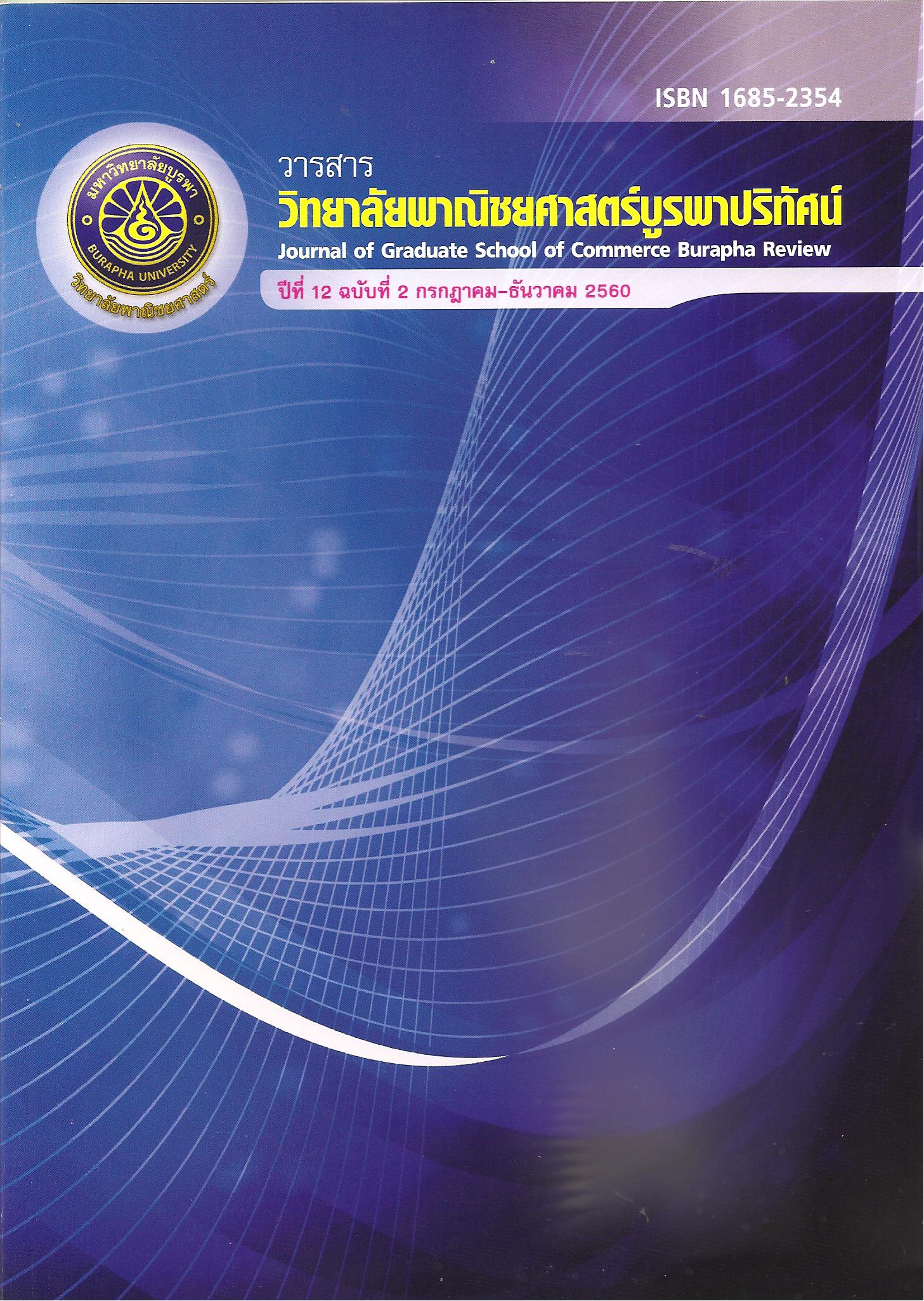การพัฒนาธุรกิจการบริการดูแลสุขภาพ ตามความคาดหวังของผู้สูงอายุ เพื่อการบริการ ในอนาคตในเขตกรุงเทพมหานครและปริมณฑล
Main Article Content
Abstract
บทคัดย่อ
การวิจัยเรื่องนี้มีวัตถุประสงค์ เพื่อศึกษาการให้บริการ คุณภาพการบริการ ความพึงพอใจ และความไว้วางใจ ความคาดหวังบริการในอนาคต และผู้วิจัยได้อธิบายและวิเคราะห์การพัฒนาด้านการดูแลสุขภาพสำหรับผู้สูงอายุตามแนวความคิดการให้บริการในอนาคตของกรุงเทพมหานครและปริมณฑล โดยใช้วิธีการวิจัยเชิงปริมาณและการวิจัยเชิงคุณภาพ กลุ่มตัวอย่างจำนวน 324 คน และสัมภาษณ์กลุ่มผู้บริหารระดับนโยบายหน่วยงานที่เกี่ยวข้อง กลุ่มผู้ประกอบการธุรกิจ และกลุ่มโรงพยาบาล จำนวน 35 ท่าน เครื่องมือที่ใช้ในการวิจัยได้แก่แบบสอบถาม และสัมภาษณ์ และทำการวิเคราะห์ข้อมูลด้วยเทคนิคทางสถิติ
การวิจัยพบว่า ด้านการบริการ ควรมีเครื่องมือและวัสดุอุปกรณ์เพียงพอให้บริการ ควรกำหนดราคาให้บริการชัดเจน ควรมีสถานที่ตั้งเดินทางสะดวก และไม่ไกลโรงพยาบาล ควรมีโปรโมชั่นในราคาพิเศษแบบแพ็คเกจ ควรมีความด้วยมาตรฐานเดียวกัน และสถานที่ควรมีอากาศถ่ายเทสะดวก ด้านคุณภาพการบริการ เจ้าหน้าที่แต่งกายสุภาพ สะอาด เรียบร้อย มี ด้านความพึงพอใจ มีการมอบหมายเจ้าหน้าที่ดูแลผู้สูงอายุอย่างทั่วถึง มีอุปกรณ์พร้อมใช้งานได้ตลอดเวลา ด้านความไว้วางใจ มีการประสานญาติหรือผู้รับผิดชอบแต่ละราย เพื่อชี้แจงการวางแผนการรักษา และการบำบัดรักษาให้รับทราบ ด้านความคาดหวังบริการในอนาคต ควรมีการจัดบริการพิเศษกับผู้สูงอายุ และสิ่งอำนวยความสะดวกที่ได้มาตรฐานและทันสมัยเพื่อให้บริการผู้สูงอายุ
นอกจากนี้นักวิจัยพบว่า รูปแบบการพัฒนาธุรกิจความคาดหวังบริการในอนาคต ที่มีชื่อว่า “HOME HEALTH CARE” ซึ่งหมายถึง บ้านดูแลสุขภาพสำหรับผู้สูงอายุที่มีทำเลที่ตั้งและสภาพแวดล้อมทางกายภาพที่ดี มีความสุขกาย สบายใจ การใช้จ่ายเงินไม่มาก ได้รับการดูแลจาก พยาบาลวิชาชีพ และบริการระดับมาตรฐาน การติดต่อสื่อสารที่เข้าใจง่าย บุคลากรมีความชำนาญ มีความรู้ความสามารถ มีมนุษย์สัมพันธ์ สร้างความเชื่อมั่น ความไว้วางใจในบริการ สามารถตอบสนองบริการ แก้ปัญหาอย่างรวดเร็วตามที่ต้องการ และให้บริการที่ปราศจากอันตราย ความเสี่ยง และมีความปลอดภัย พร้อมให้บริการอย่างต่อเนื่องในการดูแล และบริการลูกค้าในสถานการณ์ที่แตกต่างกัน
ABSTRACT
In this dissertation, the researcher examines the provision of services, service quality, satisfaction, and trust, as well as future service expectations. In this connection, the researcher describes and analyzes the development of the health care for the elderly service business as grounded in future service expectations in Bangkok Metropolis and its environs (Nonthaburi, Pathum Thani, and Nakhon Pathom). In carrying out this investigation, the researcher employed both quantitative and qualitative methods. The sample population consisted of 324 subjects. In the qualitative phase of research, the researcher interviewed 35 policy-level administrators employed at concerned agencies and hospitals, or who were operators of related businesses. In the quantitative phase of research, the researcher carried out a survey investigation. The research instruments for the qualitative phase of research were interviews and a concomitant interview form. The research instrument for the quantitative phase of research was a questionnaire. The data collected were analyzed using statistical techniques.
Findings are as follows: The researcher determined that service provision should be sufficient insofar as concerns the aspects of services, equipment, and instruments. As such, the researcher recommends that service prices should be clearly specified. Locations should be convenient to access and close to hospitals. Special price promotions in the form of packages should be offered. Treatment of clients must not be discriminatory. All services provided should meet the same standards. Locations should be airy, properly ventilated, clean, and free of undue glare from sunlight. In the aspect of service quality, personnel should adhere to strict hygiene in addition to being polite, and wearing proper attire. Treatment information should be accurately recorded. All personnel should willingly provide services. They should be warm, friendly, polite, gentle, and evince caring for their elderly clients. In the aspect of satisfaction, personnel should be assigned to undertake the complete care of their elderly clients. Equipment should be ready for use at all times. In the aspect of trust, family members or other responsible persons should be given explanations of treatment plans and therapy. In the aspect of future service expectations, special services should be provided to the elderly and facilities are standard and modern to serve the elderly.
In addition, the researcher found that the business development model future service expectations are called “Home Health Care.” The term “Home Health Care” refers to a well-located home which provides health care for the elderly with a good location in a good physical environment. In such a home, the elderly clients would be physically and mentally satisfied. Costs would not be extravagant and they could be cared for by professional nurses and providers of standardized services. Communications with the elderly clients would be designed so as to be easily comprehended by them. Personnel would have expertise, knowledge, capabilities, and would be skilled at human relations. This would create the belief that the services provided were reliable and trust in the services would be thereby instilled. Personnel would be responsive in providing services and able to solve problems with alacrity while fulfilling client desires. They could provide safe, risk-free, and secure services to clients on a continuous basis in variegated situation.
Article Details
The owner of the article does not copy or violate any of its copyright. If any copyright infringement occurs or prosecution, in any case, the Editorial Board is not involved in all the rights to the owner of the article to be performed.


